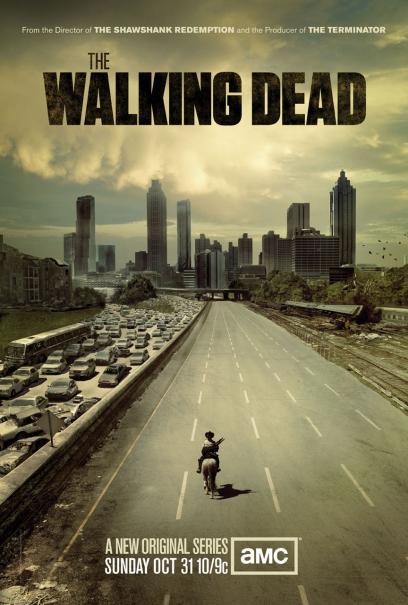 THE THINKING DEAD SYMPOSIUM
THE THINKING DEAD SYMPOSIUM
Zombies are everywhere in our global pop culture. Zombies populate movies and hit TV shows like The Walking Dead. We know zombies do not really exist, so why the popularity? This creative and provocative discussion will explore the "Zombie Apocalypse" and its many meanings — some of which will eat at your brain long after Halloween.
TITLE: The Thinking Dead: What the Zombie Apocalypse Means
 CITY: Philadelphia
CITY: Philadelphia
DATE: Halloween, October 31, 2012
TIME: 6:30 - 8:30
LOCATION: Gladfelter Hall, Room L-24, Temple campus.
ADMISSION: Free. But you must reserve your seat through Eventbrite. Click here: Get ticket.
Note: 119 people attended the event.
CO-SPONSORS:
Department of Media Studies and Production, Temple University.
The Center for Media and Destiny
PANELISTS
Murali Balaji, Assistant Professor, Temple University
Gordon Coonfield, Associate Professor, Villanova University
Patrick Hamilton, Assistant Professor, Misericordia University
Angela Cirucci, PhD Student, Temple University
Barry Vacker, Associate Professor, Temple University
SUMMARY OF PRESENTATIONS
Murali Balaji
"Eating the Dead: Zombie Consumption, Synergy and the Political Economy of Zombie Culture"
Since its premiere in October 2010, AMC's The Walking Dead became the network's most popular show, drawing millions of fans to its weekly airings as well as AMC-affiliated web sites. The popularity of zombies, highlighted by textual synergy in the popular graphic novel, the TV show and web content, highlights how cultural producers are now packaging cultural texts in a way that makes them virtually inextricable from one another (to follow the storyline, you must consume them in multiple media forms). This facilitates "clustered" consumption and cultivates users who are willing to follow a specific cultural brand in its various incarnations. While shows such as The X-Files had similar synergistic success in its television and movie crossover, the Internet has offered new opportunities for AMC to maintain consumer interest in The Walking Dead throughout the year without actually investing in the product. Using political economy, particularly frameworks advanced by both Meehan (2005) and Hesmondhalgh (2007), I intend to highlight some of the implications of AMC's strategy.
Gordon Coonfield
"Perfect Strangers: Zombie Apocalypse and the Rest of Us"
Zombies are perfect strangers. Though they were us (sometimes), they are no longer even remotely human. If they drag some vestige of their past humanity along like a useless, rotting limb, they do so simply to reinforce the fact of their absolute difference. In this presentation, I want to consider the social significance of such figures of absolute difference for what they reveal about the nature of human community. Their status as absolute other and the play between this otherness and their former humanity, enables a consideration of the interesting ways the zombie apocalypse propels survivors (and the rest of us) toward a struggle to make life--which is always already social life—meaningful, especially in the face of the death of meaning.
Patrick Hamilton
"Danger! Zombies Ahead: Zombies as Metaphor in Pop Culture versus the Media"
Zombies have proven to be a flexible metaphor for confronting its audience with such contemporary issues and anxieties as conformity, materialism, and bioterrorism in popular culture (film, TV, comic books, etc.). Such pop culture applications tend to serve as a form of critique and challenge to cultural values and mores. However, recent media appropriations of the zombie (so-called "zombie crimes" and the zombie apocalypse) threaten to dilute the effectiveness of zombie-as-metaphor in how these appropriations seek to distract from or otherwise contain threats and anxieties rather than confront and challenge us with them.
Angela Circucci View/Download PDF
"The Social Dead: Exploring Our Obsessions With Zombies and Social Media"
The American obsession with zombies extends back at least to the 1930s when voodoo and zombie films became popular, providing audiences with commentary about the country's social and economic problems while tapping into their paranoia. As the zombie film genre emerged, story lines became less focused on the zombies themselves and more focused on the living characters and their individual struggles. Our obsession with photographs has likewise evolved. Since the earliest cameras people have been fascinated with photos of themselves and loved ones. Narratives of generations of families and their cultures were created through photo albums. In his Camera Lucida, Roland Barthes argues that the subject of a photograph is a kind of simulacrum, a "return of the dead." Just as the characters in zombie films and television shows struggle with their situations, social media users grapple with photographs and narratives as they are sucked into a past life that no longer exists. This paper will explore the similarities between our current obsessions of both zombie culture and social media.
Barry Vacker View/Download PDF
"Space Junk, the Second Event, and the Wild State: The Cosmic Meaning of the Zombie Apocalypse"
This presentation will explore the cosmic and existential meanings of the Zombie Apocalypse by drawing from cosmology and critical theory to analyze The Walking Dead from two perspectives. 1) The cosmic issues posed in The Walking Dead and other zombie and science-fiction films, including The Night of the Living Dead and Invasion of the Body Snatchers. 2) The existential meaning of the “zombie” in relation to other human archetypes, from premodern tribalization to postmodern globalization.
